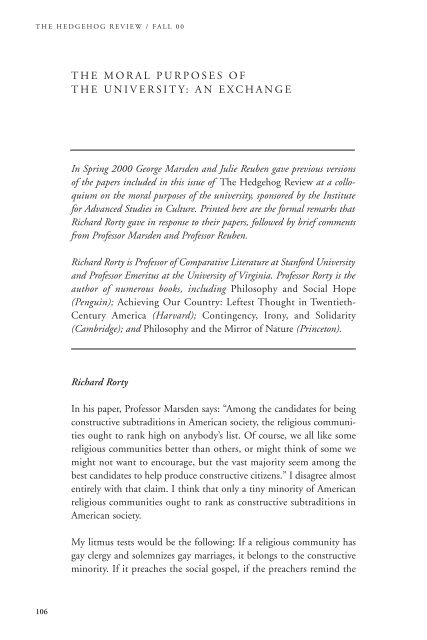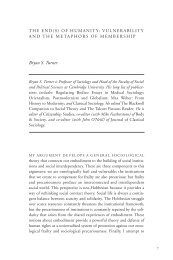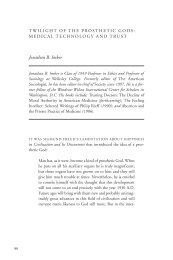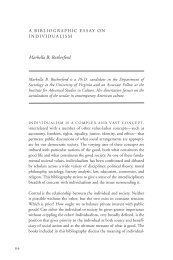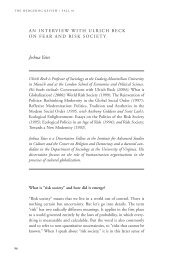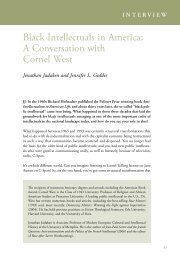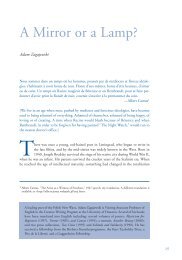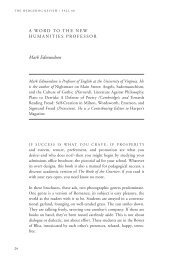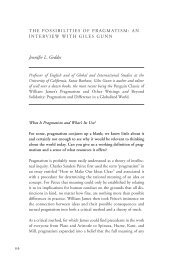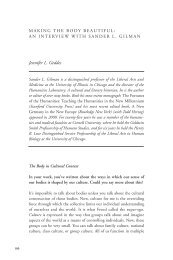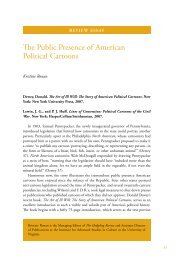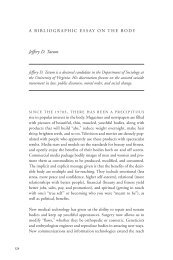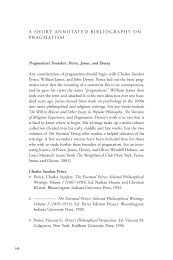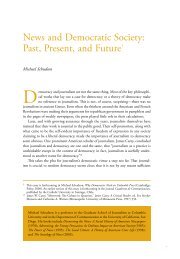the moral purposes of the university - Institute for Advanced Studies ...
the moral purposes of the university - Institute for Advanced Studies ...
the moral purposes of the university - Institute for Advanced Studies ...
Create successful ePaper yourself
Turn your PDF publications into a flip-book with our unique Google optimized e-Paper software.
THE HEDGEHOG REVIEW / FALL 00<br />
THE MORAL PURPOSES OF<br />
THE UNIVERSITY: AN EXCHANGE<br />
In Spring 2000 George Marsden and Julie Reuben gave previous versions<br />
<strong>of</strong> <strong>the</strong> papers included in this issue <strong>of</strong> The Hedgehog Review at a colloquium<br />
on <strong>the</strong> <strong>moral</strong> <strong>purposes</strong> <strong>of</strong> <strong>the</strong> <strong>university</strong>, sponsored by <strong>the</strong> <strong>Institute</strong><br />
<strong>for</strong> <strong>Advanced</strong> <strong>Studies</strong> in Culture. Printed here are <strong>the</strong> <strong>for</strong>mal remarks that<br />
Richard Rorty gave in response to <strong>the</strong>ir papers, followed by brief comments<br />
from Pr<strong>of</strong>essor Marsden and Pr<strong>of</strong>essor Reuben.<br />
Richard Rorty is Pr<strong>of</strong>essor <strong>of</strong> Comparative Literature at Stan<strong>for</strong>d University<br />
and Pr<strong>of</strong>essor Emeritus at <strong>the</strong> University <strong>of</strong> Virginia. Pr<strong>of</strong>essor Rorty is <strong>the</strong><br />
author <strong>of</strong> numerous books, including Philosophy and Social Hope<br />
(Penguin); Achieving Our Country: Leftest Thought in Twentieth-<br />
Century America (Harvard); Contingency, Irony, and Solidarity<br />
(Cambridge); and Philosophy and <strong>the</strong> Mirror <strong>of</strong> Nature (Princeton).<br />
Richard Rorty<br />
In his paper, Pr<strong>of</strong>essor Marsden says: “Among <strong>the</strong> candidates <strong>for</strong> being<br />
constructive subtraditions in American society, <strong>the</strong> religious communities<br />
ought to rank high on anybody’s list. Of course, we all like some<br />
religious communities better than o<strong>the</strong>rs, or might think <strong>of</strong> some we<br />
might not want to encourage, but <strong>the</strong> vast majority seem among <strong>the</strong><br />
best candidates to help produce constructive citizens.” I disagree almost<br />
entirely with that claim. I think that only a tiny minority <strong>of</strong> American<br />
religious communities ought to rank as constructive subtraditions in<br />
American society.<br />
My litmus tests would be <strong>the</strong> following: If a religious community has<br />
gay clergy and solemnizes gay marriages, it belongs to <strong>the</strong> constructive<br />
minority. If it preaches <strong>the</strong> social gospel, if <strong>the</strong> preachers remind <strong>the</strong><br />
106
THE MORAL PURPOSES OF THE UNIVERSITY / RORTY<br />
congregation that <strong>the</strong> richest country in <strong>the</strong> world at <strong>the</strong> richest point<br />
in its economic history still doesn’t feed its poor, <strong>the</strong>n it also qualifies. I<br />
don’t think <strong>the</strong>re are very many religious communities <strong>of</strong> this sort. The<br />
vast majority <strong>of</strong> <strong>the</strong>m do not meet ei<strong>the</strong>r <strong>of</strong> <strong>the</strong>se litmus tests.<br />
One reason I would give <strong>the</strong> title <strong>of</strong> “constructive” only to this small<br />
minority is that I am a militant secularist. I think that <strong>the</strong><br />
Enlightenment was right to suggest that religion is something that <strong>the</strong><br />
human species would be better if it could outgrow. Diderot suggested<br />
that <strong>the</strong> last king should be strangled with <strong>the</strong> entrails <strong>of</strong> <strong>the</strong> last priest.<br />
Bentham and Mr. Jefferson founded secular universities because <strong>the</strong>y<br />
had developed a justified distrust <strong>of</strong> <strong>the</strong> churches. Later on, Marx<br />
described religion as <strong>the</strong> opiate <strong>of</strong> <strong>the</strong> people. Even though some <strong>of</strong> my<br />
best friends are priests, I feel some sympathy with all <strong>the</strong>se critics <strong>of</strong><br />
religious institutions.<br />
As I see it, <strong>the</strong> religious idea <strong>of</strong> post-mortem rewards and punishments<br />
has, just as Marx said, functioned to decrease <strong>the</strong> libidinal energy available<br />
<strong>for</strong> re<strong>for</strong>m here below–<strong>for</strong> <strong>the</strong> attempt to create heaven on earth.<br />
To be sure, various Christian and o<strong>the</strong>r religious groups have occasionally<br />
done a lot to decrease human suffering. The black churches in <strong>the</strong><br />
Civil Rights movement and <strong>the</strong> social gospel churches in <strong>the</strong> great days<br />
<strong>of</strong> <strong>the</strong> Progressive Era are conspicuous examples. But <strong>the</strong>se ef<strong>for</strong>ts strike<br />
me as relatively insignificant by comparison with <strong>the</strong> reactionary tendencies<br />
<strong>of</strong> most <strong>of</strong> <strong>the</strong> churches. Because <strong>the</strong> churches have failed to do<br />
much to relieve unnecessary human suffering, and have indeed greatly<br />
increased it, I find <strong>the</strong> rise <strong>of</strong> church attendance in <strong>the</strong> United States<br />
depressing. This rise makes me fear <strong>for</strong> <strong>the</strong> republic. If it continues, if<br />
more and more people seek solace in <strong>the</strong> world beyond, I fear that <strong>the</strong>re<br />
will be less social re<strong>for</strong>m, less pressure <strong>for</strong> social justice.<br />
Europe seems to me safer than <strong>the</strong> U.S. from <strong>the</strong> threat <strong>of</strong> fascism that<br />
will accompany a serious collapse in <strong>the</strong> global economy. One reason <strong>for</strong><br />
this is <strong>the</strong> decline in church attendance in Europe, which contrasts very<br />
sharply with its rise in <strong>the</strong> United States. I’m afraid that if <strong>the</strong> world<br />
experiences a second Great Depression, Fa<strong>the</strong>r Coughlin-like figures<br />
may become leaders <strong>of</strong> right-wing populist revolts against democratic<br />
institutions. So I see democracy as safest where church attendance has<br />
107
THE HEDGEHOG REVIEW / FALL 00<br />
been going down. I agree with Senator McCain that Jerry Falwell and<br />
Pat Robertson are evil. They are just <strong>the</strong> sort <strong>of</strong> Coughlin-like figures I<br />
fear. Yet <strong>the</strong>y are <strong>the</strong> most politically prominent and efficacious Christian<br />
leaders in <strong>the</strong> U.S. Christianity disgraces itself when it countenances<br />
such men. No subtradition that does so can be called “constructive.”<br />
So much <strong>for</strong> my overall outlook on <strong>the</strong> role <strong>of</strong> religion in society. I now<br />
want to say something about <strong>the</strong> history <strong>of</strong> <strong>the</strong> America <strong>university</strong>. I’m<br />
very grateful to <strong>the</strong> <strong>Institute</strong> <strong>for</strong> <strong>Advanced</strong> <strong>Studies</strong> in Culture <strong>for</strong> giving<br />
me an occasion to read Pr<strong>of</strong>essor Reuben’s The Making <strong>of</strong> <strong>the</strong> Modern<br />
University and Pr<strong>of</strong>essor Marsden’s The Soul <strong>of</strong> <strong>the</strong> American University.<br />
They are very in<strong>for</strong>mative books. I learned an enormous amount from<br />
<strong>the</strong>m. I disagree with <strong>the</strong> overall perspective from which <strong>the</strong>y are written,<br />
but I know a lot more about <strong>the</strong> American <strong>university</strong> after reading<br />
<strong>the</strong>m than I did be<strong>for</strong>e.<br />
If I were writing a history <strong>of</strong> <strong>the</strong> American <strong>university</strong>, I would tell an<br />
upbeat story about <strong>the</strong> gradual replacement <strong>of</strong> <strong>the</strong> churches by <strong>the</strong> universities<br />
as <strong>the</strong> conscience <strong>of</strong> <strong>the</strong> nation. One <strong>of</strong> <strong>the</strong> most important<br />
things that happened in <strong>the</strong> U.S. in <strong>the</strong> twentieth century was that <strong>the</strong><br />
universities became <strong>the</strong> places where movements <strong>for</strong> <strong>the</strong> relief <strong>of</strong> human<br />
suffering found privileged sanctuaries and power bases. The universities<br />
came to play a social role that <strong>the</strong>y had not played in <strong>the</strong> nineteenth<br />
century. Today <strong>the</strong> American universities not only <strong>for</strong>m <strong>the</strong> best system<br />
<strong>of</strong> higher education in <strong>the</strong> world, but are <strong>moral</strong>ly impressive institutions.<br />
They are not incoherent, nor are <strong>the</strong>y in crisis. They could, <strong>of</strong><br />
course, do more <strong>for</strong> <strong>the</strong> relief <strong>of</strong> human suffering than <strong>the</strong>y presently<br />
do, but we can look back over a century during which a great deal <strong>of</strong><br />
<strong>the</strong> <strong>moral</strong> progress that America achieved took inspiration and example<br />
from <strong>the</strong> universities.<br />
The <strong>moral</strong> progress I have in mind began in <strong>the</strong> Progressive Era, and<br />
runs from <strong>the</strong> various re<strong>for</strong>ms that were made possible by Teddy<br />
Roosevelt and by Wilson through <strong>the</strong> New Deal, <strong>the</strong> Great Society legislation,<br />
<strong>the</strong> Civil Rights movement, second-wave feminism, and <strong>the</strong><br />
gay rights movement. In all <strong>of</strong> <strong>the</strong>se, <strong>the</strong> universities played a prominent<br />
role. Academic social scientists were <strong>of</strong> enormous value to <strong>the</strong><br />
Progressives and to <strong>the</strong> New Deal. Some, though hardly all, <strong>of</strong> <strong>the</strong><br />
108
THE MORAL PURPOSES OF THE UNIVERSITY / RORTY<br />
churches played a central role in <strong>the</strong> Civil Rights movement, but an<br />
equally central role was played by <strong>the</strong> colleges and universities.<br />
The churches have not done much <strong>for</strong> ei<strong>the</strong>r feminism or gay rights.<br />
The universities have done a great deal. Ins<strong>of</strong>ar as <strong>the</strong>re is still any ideological<br />
pressure <strong>for</strong> social justice in this country, it finds itself concentrated<br />
on <strong>the</strong> campus, ra<strong>the</strong>r than in <strong>the</strong> churches. One <strong>of</strong> <strong>the</strong> nicest<br />
things you can say about <strong>the</strong> American <strong>university</strong> is that <strong>university</strong><br />
towns tend to be Democratic islands in Republican oceans. The most<br />
depressing thing about <strong>the</strong> recent behavior <strong>of</strong> <strong>the</strong> American <strong>university</strong><br />
is that <strong>the</strong> kind <strong>of</strong> enthusiasm which students once showed <strong>for</strong><br />
McCarthy and McGovern was not shown <strong>for</strong> Bradley or McCain.<br />
There was no student uprising, so to speak, to abolish <strong>the</strong> systematic<br />
corruption that now makes a mockery <strong>of</strong> our government. It is as if <strong>the</strong><br />
students had decided to let American politics pass <strong>the</strong>m by.<br />
I want to turn now to <strong>the</strong> relation between <strong>moral</strong>ity and religion, and<br />
to distinguish between three senses <strong>of</strong> <strong>the</strong> term “<strong>moral</strong>.” In one sense,<br />
this term is used to describe someone relatively decent, trustworthy,<br />
and honest–one who gives correct change, keeps promises, doesn’t lie<br />
much, can usually be relied upon to take an appropriate share in cooperative<br />
ef<strong>for</strong>ts, and so on. It seems to me if you’re not that sort <strong>of</strong> person<br />
by <strong>the</strong> time you’re eighteen, it’s probably too late. I don’t think that<br />
sociopaths who enter <strong>the</strong> <strong>university</strong> are corrigible by any measures that<br />
<strong>the</strong> academy might adopt. If <strong>the</strong> family, <strong>the</strong> community, <strong>the</strong> church,<br />
and <strong>the</strong> like, haven’t made you a relatively decent member <strong>of</strong> society,<br />
haven’t given you a conscience that stops you from cheating <strong>the</strong> customers,<br />
administering date rape drugs, or doing a lot <strong>of</strong> things we hope<br />
our eighteen year olds won’t do, <strong>the</strong> <strong>university</strong> won’t ei<strong>the</strong>r. The academy<br />
can’t take on <strong>the</strong> job <strong>of</strong> straightening you out, <strong>of</strong> creating <strong>the</strong> conscience<br />
that <strong>the</strong> rest <strong>of</strong> <strong>the</strong> culture didn’t manage to produce during<br />
your first eighteen years.<br />
In this first sense <strong>of</strong> <strong>moral</strong>ity, everybody–except <strong>for</strong> <strong>the</strong> odd sociopath–<br />
has a <strong>moral</strong>ity. Even <strong>the</strong> Nazis. Even <strong>the</strong> samurai. Even <strong>the</strong>y are honest,<br />
responsible, decent, and truth-telling in <strong>the</strong>ir behavior toward a certain<br />
group <strong>of</strong> people, those whom <strong>the</strong>y consider <strong>the</strong>ir <strong>moral</strong> equals. They<br />
may not consider Jews or blacks or untouchables <strong>the</strong>ir <strong>moral</strong> equals,<br />
109
THE HEDGEHOG REVIEW / FALL 00<br />
however. Almost all <strong>of</strong> us who were brought up in any kind <strong>of</strong> coherent<br />
society or community–good, bad, or indifferent–acquire a sense <strong>of</strong><br />
<strong>moral</strong> obligation to some people, <strong>the</strong> people whom we think <strong>of</strong> as “like<br />
ourselves.”<br />
Moral progress on a world-historical scale consists in enlarging <strong>the</strong><br />
range <strong>of</strong> people whom we think <strong>of</strong> as people like us. Barbarians, <strong>for</strong><br />
example, get in as well as Greeks. Greeks get in as well as Jews. Women<br />
get in as well as men. Blacks get in as well as whites. Gays get in as well<br />
as straights. The more fea<strong>the</strong>rless bipeds you include in your list <strong>of</strong> who<br />
counts, who matters, <strong>the</strong> people to whom you have obligations, <strong>the</strong><br />
more <strong>moral</strong>ly advanced you are. I think <strong>of</strong> Americans as having made<br />
great progress in <strong>the</strong> course <strong>of</strong> <strong>the</strong> twentieth century in enlarging <strong>the</strong>ir<br />
sense <strong>of</strong> who counts. The Christian churches have not made nearly as<br />
much <strong>of</strong> a contribution to this process <strong>of</strong> <strong>moral</strong> improvement as Mr.<br />
Jefferson hoped <strong>the</strong>y might.<br />
There is, however, ano<strong>the</strong>r sense <strong>of</strong> “<strong>moral</strong>.” People who use <strong>the</strong> word<br />
in this second sense think <strong>of</strong> certain sexual behavior as <strong>the</strong> paradigm<br />
case <strong>of</strong> im<strong>moral</strong>ity. They think <strong>of</strong> possession <strong>of</strong> a good <strong>moral</strong> character<br />
as manifested in not <strong>for</strong>nicating, masturbating, committing sodomy,<br />
committing adultery, and <strong>the</strong> like. I hope that “<strong>moral</strong>” will eventually<br />
cease to be employed in this sense. People should not think sex that<br />
important, and should not base judgments <strong>of</strong> <strong>the</strong> worth <strong>of</strong> <strong>the</strong>ir fellow<br />
human beings on what <strong>the</strong>y do or don’t do in bed. The churches have<br />
been largely responsible <strong>for</strong> keeping sex prominent in discussions <strong>of</strong><br />
<strong>moral</strong>ity. It is hard to <strong>for</strong>give <strong>the</strong>m <strong>for</strong> this.<br />
Finally <strong>the</strong>re is a third sense <strong>of</strong> “<strong>moral</strong>,” one which can be explicated by<br />
reference to <strong>the</strong> utilitarian principle. Utilitarians like myself think that<br />
<strong>moral</strong>ity is <strong>the</strong> attempt to decrease <strong>the</strong> amount <strong>of</strong> suffering among<br />
human beings. This attempt has very little to do with sex, but a great<br />
deal to do with money. Most <strong>of</strong> <strong>the</strong> suffering in <strong>the</strong> world is caused by<br />
<strong>the</strong> rich taking money away from <strong>the</strong> poor. Occasionally <strong>the</strong> churches<br />
have joined in <strong>the</strong> ef<strong>for</strong>t to get <strong>the</strong> rich to give some <strong>of</strong> <strong>the</strong> money back<br />
to <strong>the</strong> poor. More <strong>of</strong>ten, <strong>the</strong>y have not. So, I’m inclined to think that<br />
in this last, and to my mind, most important sense <strong>of</strong> <strong>moral</strong>ity, <strong>the</strong> secular<br />
culture has done a lot more than <strong>the</strong> churches have <strong>for</strong> <strong>moral</strong>ity.<br />
110
THE MORAL PURPOSES OF THE UNIVERSITY / RORTY<br />
I agree with Pr<strong>of</strong>essor Marsden’s point that pragmatism borrows a lot <strong>of</strong><br />
<strong>moral</strong> capital from religion. The Enlightenment itself borrowed a lot <strong>of</strong><br />
<strong>moral</strong> capital from <strong>the</strong> Christian Scriptures. Because people like Mr.<br />
Jefferson were able to quote relevant passages from those scriptures<br />
(passages about loving one ano<strong>the</strong>r, human bro<strong>the</strong>rhood, nei<strong>the</strong>r Jew<br />
nor Greek, etcetera) <strong>the</strong> thinkers <strong>of</strong> <strong>the</strong> Enlightenment were sometimes<br />
able to present <strong>the</strong>mselves as reviving <strong>the</strong> true spirit <strong>of</strong> Christ. Still, <strong>the</strong><br />
Enlightenment was an advance on Christianity because it left o<strong>the</strong>rworldliness<br />
behind. It stuck to <strong>the</strong> portions <strong>of</strong> <strong>the</strong> Christian Scriptures<br />
that could be applied to actions in this world. When a<strong>the</strong>ists like<br />
Voltaire and Marx suggested that we drop hope <strong>of</strong> extraterrestrial<br />
reward, and encourage <strong>the</strong> peasants and workers to think that things<br />
would only become better if <strong>the</strong>y took action on earth, a great step was<br />
taken <strong>for</strong> <strong>the</strong> diminution <strong>of</strong> human suffering.<br />
Let me now say something about <strong>the</strong> universities as sites <strong>of</strong> <strong>moral</strong> education.<br />
I do not think this is a topic that administrators or faculty senates<br />
should be thinking about. As I said be<strong>for</strong>e, if <strong>the</strong> students aren’t<br />
reasonably honest and decent people by <strong>the</strong> time <strong>the</strong>y hit <strong>the</strong> <strong>university</strong>,<br />
I don’t see that <strong>the</strong>re is much that we in higher education can do<br />
about it. If <strong>the</strong>y’re given, despite being honest and decent, to <strong>for</strong>nication<br />
and sodomy, that is none <strong>of</strong> <strong>the</strong> <strong>university</strong>’s business.<br />
On <strong>the</strong> o<strong>the</strong>r hand, if <strong>the</strong> students are uninterested in <strong>the</strong> quest <strong>for</strong><br />
social justice, if <strong>the</strong>y’re fundamentally selfish and have no interest in<br />
<strong>the</strong> relief <strong>of</strong> suffering in our society, <strong>the</strong>n perhaps <strong>the</strong> <strong>university</strong> should<br />
be concerned. I wouldn’t trust <strong>the</strong> administration to handle this kind <strong>of</strong><br />
thing, but maybe <strong>the</strong> faculty should say to itself: “Hey, we belong to a<br />
great <strong>moral</strong> tradition, <strong>the</strong> tradition <strong>of</strong> American progressivism, <strong>the</strong> tradition<br />
<strong>of</strong> <strong>the</strong> New Deal, <strong>the</strong> tradition <strong>of</strong> <strong>the</strong> Civil Rights movement.<br />
We have been <strong>the</strong> <strong>moral</strong> leaders <strong>of</strong> <strong>the</strong> nation. We have, at our best,<br />
been its conscience. If we’re not being its conscience any more, perhaps<br />
we’re doing something wrong.” I don’t, however, know what <strong>the</strong> faculty<br />
should say next. Suppose a faculty does reach that conclusion, what<br />
does it do? Perhaps nothing as a corporate body, but maybe as individuals<br />
<strong>the</strong> pr<strong>of</strong>essors could try to slip a few more appeals to pity and charity<br />
into <strong>the</strong>ir lectures.<br />
111
THE HEDGEHOG REVIEW / FALL 00<br />
Now I’d like to turn to some very interesting remarks <strong>of</strong> Pr<strong>of</strong>essor<br />
Reuben’s on <strong>the</strong> relation between <strong>the</strong> true and <strong>the</strong> good. She said that<br />
<strong>the</strong> history <strong>of</strong> <strong>the</strong> <strong>university</strong> shows that <strong>the</strong> problem <strong>of</strong> <strong>moral</strong>ity is an<br />
epistemological one. I am dubious about this. I don’t think that <strong>the</strong>re’s<br />
anything very interesting to be said about how we justify our <strong>moral</strong><br />
judgments, nor about what epistemological outlook we should adopt<br />
when asking ourselves questions about <strong>the</strong> right thing to do. As far as I<br />
can see, epistemology as a philosophical discipline has been a complete<br />
flop. I would hesitate to recommend a fur<strong>the</strong>r dose <strong>of</strong> it.<br />
To my way <strong>of</strong> thinking–and here I put on my philosopher’s hat and<br />
<strong>of</strong>fer a controversial philosophical view–knowledge is equally objective<br />
in all areas, ethics as much as physics and logic. We get <strong>moral</strong> truth,<br />
Dewey rightly said, in exactly <strong>the</strong> same way that we get scientific truth.<br />
Moral truth is more difficult to agree on, more controversial, but it is<br />
not subjective as opposed to objective, or relative as opposed to<br />
absolute. We experiment with various scientific <strong>the</strong>ories and see which<br />
does <strong>the</strong> best job <strong>of</strong> combining predictive power, elegance, fruitfulness,<br />
and all <strong>the</strong> rest <strong>of</strong> it. We experiment with various <strong>moral</strong> identities, various<br />
<strong>moral</strong> communities, and see which <strong>of</strong> <strong>the</strong>m does <strong>the</strong> best job <strong>of</strong><br />
decreasing human suffering. We learn through experiment that some<br />
things we thought might work won’t. We learned, <strong>for</strong> example, that<br />
nationalizing <strong>the</strong> means <strong>of</strong> production will probably not decrease<br />
human suffering. O<strong>the</strong>r experiments taught us that <strong>the</strong> traditional<br />
teaching <strong>of</strong> <strong>the</strong> churches about sex is likely to increase human suffering.<br />
These discoveries were not made by subjective introspection <strong>of</strong> emotional<br />
states, nor were <strong>the</strong>y obtained by getting a clearer understanding <strong>of</strong><br />
<strong>the</strong> deliverances <strong>of</strong> what Kant called “pure practical reason.” They were<br />
made as a result <strong>of</strong> living through various social experiments and watching<br />
<strong>the</strong> results. We <strong>the</strong>reby obtained objective <strong>moral</strong> truths, or at least<br />
<strong>the</strong> best candidates <strong>for</strong> such truth so far available. Science and <strong>moral</strong>ity<br />
are on an epistemological par. They <strong>of</strong>fer precisely <strong>the</strong> same kinds <strong>of</strong><br />
knowledge, attained in precisely <strong>the</strong> same ways. That is why I don’t think<br />
<strong>the</strong>re’s much to be said about <strong>the</strong> epistemology <strong>of</strong> <strong>moral</strong>ity.<br />
112
THE MORAL PURPOSES OF THE UNIVERSITY / RORTY<br />
Pr<strong>of</strong>essor Reuben gives a very interesting account <strong>of</strong> <strong>the</strong> way in which<br />
<strong>the</strong> religious notion that everything converges–that God, knowledge,<br />
and truth are one–got converted by nineteenth-century scientism into<br />
<strong>the</strong> view that everything will come toge<strong>the</strong>r in unified science. This view<br />
remains very popular among scientists. Anyone who has read E. O.<br />
Wilson’s book, Concilience: The Unity <strong>of</strong> Knowledge, will recognize <strong>the</strong><br />
view that natural science, if given hegemony over <strong>the</strong> rest <strong>of</strong> culture, will<br />
straighten out <strong>moral</strong>ity, <strong>the</strong> humanities, religion, everything else. That<br />
claim is analogous to <strong>the</strong> one made occasionally by <strong>the</strong> Catholic<br />
Church–that if it were given authority over natural science, <strong>the</strong> humanities,<br />
art, and everything else, it would straighten everything out by bringing<br />
it all into con<strong>for</strong>mity with <strong>the</strong> divine word. E. O. Wilson’s claim<br />
seems to me as dubious as Pius X’s. I don’t think <strong>the</strong>re is any hope <strong>of</strong><br />
ei<strong>the</strong>r <strong>the</strong> churches or <strong>the</strong> natural scientists bringing this sort <strong>of</strong> order or<br />
unification or convergence into existence, nor any need to search <strong>for</strong> it.<br />
One reason we don’t need such unification is suggested by <strong>the</strong> pragmatist<br />
view that, as William James put it, <strong>the</strong> true is <strong>the</strong> good in <strong>the</strong> way<br />
<strong>of</strong> belief. Intellectual activity is a matter <strong>of</strong> finding <strong>the</strong> right thing to<br />
do, including <strong>the</strong> right thing to believe. We adopt whatever candidate<br />
<strong>for</strong> action or <strong>for</strong> belief seems to us at <strong>the</strong> moment to conduce best to<br />
<strong>the</strong> fulfillment <strong>of</strong> our various needs–<strong>the</strong>oretical needs, practical needs,<br />
<strong>moral</strong> needs, aes<strong>the</strong>tic needs, all kinds <strong>of</strong> needs. All inquiry is a matter<br />
<strong>of</strong> reweaving our web <strong>of</strong> beliefs and desires in such a way as to produce<br />
satisfactory solutions to our problems. When we have such a solution,<br />
we say that we have found <strong>the</strong> right thing to do, or <strong>the</strong> right proposition<br />
to believe.<br />
I suspect that <strong>the</strong>re is nothing much more to be said about <strong>the</strong> relation<br />
between truth and goodness, or between fact and value. The separation<br />
<strong>of</strong> fact and value was indeed, as Pr<strong>of</strong>essor Reuben says, a big deal<br />
<strong>for</strong> <strong>the</strong> logical positivists, as it was in nineteenth-century scientism. But<br />
discussion <strong>of</strong> that separation is a philosophical dead end. The only core<br />
<strong>of</strong> truth in <strong>the</strong> notion that <strong>the</strong>re’s a difference between fact or value, or<br />
a difference between <strong>the</strong> is and <strong>the</strong> ought, is that, pace E. O. Wilson, it<br />
is one thing to find out how things work and ano<strong>the</strong>r thing to find out<br />
what you ought to do with <strong>the</strong>m. It’s one thing to find out how you<br />
make <strong>the</strong> rockets go up, and ano<strong>the</strong>r thing to decide where <strong>the</strong>y ought<br />
113
THE HEDGEHOG REVIEW / FALL 00<br />
to come down. It’s one thing to decide how human beings were created<br />
by evolutionary processes; it’s ano<strong>the</strong>r thing to figure out what a product<br />
<strong>of</strong> those processes ought to do with herself.<br />
On this point, <strong>the</strong>n, I agree with Pr<strong>of</strong>essor Reuben: I don’t think natural<br />
science is ever going to be <strong>of</strong> any great help in <strong>moral</strong>s, in giving us<br />
a more satisfactory human self-image. All natural science will ever do is<br />
tell us how various mechanisms–human and o<strong>the</strong>rwise–work. What we<br />
should do with <strong>the</strong>se machines will remain a separate question. In that<br />
sense, I don’t think facts and value will ever be reunited, but I don’t<br />
think <strong>the</strong>re is any need <strong>for</strong> such reunification. Unlike Pr<strong>of</strong>essor Reuben,<br />
I don’t think that we should try to regain something like <strong>the</strong> unity <strong>of</strong><br />
truth or <strong>the</strong> unity <strong>of</strong> knowledge–<strong>the</strong> sort <strong>of</strong> thing that was believed to<br />
exist both by <strong>the</strong> Protestant establishment <strong>of</strong> 1840 Harvard and by <strong>the</strong><br />
scientific establishment <strong>of</strong> 1910 Harvard, <strong>the</strong> Harvard <strong>of</strong> Charles Eliot.<br />
I don’t see that it matters whe<strong>the</strong>r or not our truths <strong>for</strong>m a nice coherent<br />
package. All we need to do is figure out what biological beliefs to<br />
have, what political beliefs to have, what <strong>moral</strong> beliefs to have, what (if<br />
any) religious beliefs to have, and so on. Putting <strong>the</strong>m toge<strong>the</strong>r into an<br />
organic whole doesn’t seem to me an urgent task.<br />
The coherence <strong>of</strong> an individual human life, however, does matter. We<br />
do want centers <strong>for</strong> our lives. Some <strong>of</strong> us get such centering from <strong>the</strong>istic<br />
belief. But William James and John Dewey, my intellectual heroes,<br />
thought that you could separate <strong>the</strong>istic belief from ecclesiastical institutions.<br />
Dewey, in his ACommon Faith, distinguished between <strong>the</strong> religious<br />
and religions. He praised <strong>the</strong> <strong>for</strong>mer and didn’t much like <strong>the</strong><br />
latter. James, in his essay “The Will to Believe,” said that when intellectual<br />
grounds fail us, our emotions are entitled to take over and determine<br />
our belief. I would rephrase that as: when it is a matter about<br />
which <strong>the</strong>re is no public justificatory procedure <strong>for</strong> settling belief, we’re<br />
entitled to make up our minds <strong>for</strong> ourselves. James thought we all had<br />
<strong>the</strong> right to be <strong>the</strong>ists or to be a<strong>the</strong>ists, but he ra<strong>the</strong>r hoped that we<br />
would exercise <strong>the</strong> <strong>for</strong>mer right at home and not in church. He liked<br />
his fa<strong>the</strong>r’s kind <strong>of</strong> religion, which was a completely idiosyncratic homebaked<br />
product–a little Emerson, a little Swedenborg, a little <strong>of</strong> this, a<br />
little <strong>of</strong> that. James thought that if we are going to acquire a religious<br />
belief, this individualistic eclecticism was <strong>the</strong> best way to go about it.<br />
114
THE MORAL PURPOSES OF THE UNIVERSITY / RORTY<br />
So my militantly secularist attitude toward <strong>the</strong> institution <strong>of</strong> <strong>the</strong> <strong>university</strong><br />
and indeed <strong>the</strong> institutions <strong>of</strong> American society generally does<br />
not presuppose <strong>the</strong> truth <strong>of</strong> a<strong>the</strong>ism. Anti-clericalism and a<strong>the</strong>ism are<br />
not <strong>the</strong> same thing. I hold to both, but my a<strong>the</strong>ism does not dictate my<br />
anti-clericalism, nor influence my views on public policy. James’ <strong>the</strong>ism<br />
did not prevent him from holding views on public policy which were<br />
pretty much <strong>the</strong> same as mine.<br />
I shall conclude by saying a little about institutional arrangements <strong>for</strong><br />
<strong>the</strong> presence or absence <strong>of</strong> religion within American universities. In his<br />
book, and particularly in its postscript, Pr<strong>of</strong>essor Marsden points out<br />
that <strong>the</strong>re’s a tension between religious and secular universities. You<br />
<strong>of</strong>ten find inhabitants <strong>of</strong> <strong>the</strong> latter saying: “Hey, Notre Dame isn’t a<br />
real <strong>university</strong>; it’s under <strong>the</strong> thumb <strong>of</strong> <strong>the</strong> Vatican.” Or: “Brigham<br />
Young isn’t a real <strong>university</strong> because it’s run by <strong>the</strong> General Authorities<br />
<strong>of</strong> <strong>the</strong> Church <strong>of</strong> Jesus Christ <strong>of</strong> <strong>the</strong> Latter Day Saints.” Pr<strong>of</strong>essor<br />
Marsden has a good point when he protests against this kind <strong>of</strong> downgrading.<br />
It seems to me that a pluralistic democracy should have room<br />
<strong>for</strong> religious institutions like Notre Dame and Brigham Young. These<br />
institutions increase <strong>the</strong> rich diversity <strong>of</strong> American life.<br />
On <strong>the</strong> o<strong>the</strong>r hand, I think that <strong>the</strong>re are certain things such institutions<br />
must do to earn <strong>the</strong> <strong>moral</strong> prestige that <strong>the</strong>y get from calling<br />
<strong>the</strong>mselves “universities.” For example, <strong>the</strong>y can admit students and<br />
faculty on <strong>the</strong> basis <strong>of</strong> religious belief, but <strong>the</strong>y can’t fire <strong>the</strong>m or expel<br />
<strong>the</strong>m on <strong>the</strong> basis <strong>of</strong> loss <strong>of</strong> religious belief. They’re stuck with <strong>the</strong>m.<br />
That is, if you hire a devout Catholic to teach biology or philosophy or<br />
something, and he loses his faith after getting tenure, that’s tough.<br />
Academic freedom prevails. He stays. If a student, admitted because<br />
she is a devout Mormon, loses her faith in sophomore year, she gets to<br />
continue on at Brigham Young anyway. I haven’t got any high-powered<br />
principle to justify this claim that you can use religion as a criterion <strong>for</strong><br />
admission but not <strong>for</strong> dumping people, but it seems to me as decent a<br />
compromise as, <strong>for</strong> example, “you can have an abortion in <strong>the</strong> first<br />
three months but not at six months.” That’s an unprincipled pragmatic<br />
compromise too. I don’t see that we are ever going to have anything<br />
better in <strong>the</strong>se areas than such compromises.<br />
115
THE HEDGEHOG REVIEW / FALL 00<br />
Pr<strong>of</strong>essor Marsden claims that a considerable stigma attaches to <strong>the</strong><br />
idea <strong>of</strong> Christian scholarship, and he may be right about this. I just<br />
wish he’d provided more horror stories as evidence. In my own discipline,<br />
I don’t see that such stigmatization occurs. There’s an organization<br />
called <strong>the</strong> Society <strong>of</strong> Christian Philosophers, whose members<br />
include some <strong>of</strong> <strong>the</strong> biggest names in <strong>the</strong> philosophy business:<br />
MacIntyre, Plantinga, McMullin, Adams, and so on. We a<strong>the</strong>ists, <strong>of</strong><br />
course, think <strong>the</strong>y’re sort <strong>of</strong> weird, just as we re<strong>for</strong>mist liberals think<br />
<strong>the</strong> Society <strong>for</strong> Marxist Philosophy is sort <strong>of</strong> weird. But “stigma” doesn’t<br />
seem to me <strong>the</strong> right term. These Christians’ books are read, discussed,<br />
awarded prizes, and all <strong>the</strong> rest <strong>of</strong> it. I don’t see that, within <strong>the</strong><br />
discipline <strong>of</strong> philosophy, <strong>the</strong>re are many horror stories to be told. But<br />
perhaps–and Pr<strong>of</strong>essor Marsden knows more about this than I do–in<br />
o<strong>the</strong>r disciplines <strong>the</strong>re is exclusion and stigmatization <strong>of</strong> <strong>the</strong> sort we<br />
don’t seem to have in philosophy.<br />
Julie Reuben Replies<br />
I wish I could believe everything you’ve said. I would like to see <strong>the</strong><br />
<strong>university</strong> in that way, but I don’t think that it’s a very accurate portrayal<br />
<strong>of</strong> <strong>the</strong> <strong>university</strong>. The idea that <strong>the</strong> <strong>university</strong> has been <strong>the</strong> <strong>moral</strong><br />
conscience <strong>of</strong> <strong>the</strong> nation historically–historically that is just not very<br />
true, particularly if what we’re largely judging as good is <strong>the</strong> promotion<br />
<strong>of</strong> progressive politics. We could bracket whe<strong>the</strong>r that’s going to be<br />
what we judge as good, but traditionally universities have been quite<br />
conservative places, not very supportive <strong>of</strong> progressive politics, very<br />
supportive <strong>of</strong> conventional power structures, punitive to faculty who<br />
step too far outside <strong>of</strong> <strong>the</strong> conventional and support social arrangements<br />
that are not very conventional.<br />
There were various early polls <strong>of</strong> political views <strong>of</strong> students and faculty.<br />
Most people would see <strong>the</strong> <strong>university</strong>, its faculty, and its students as, up<br />
until <strong>the</strong> sixties, more conservative than <strong>the</strong> rest <strong>of</strong> <strong>the</strong> nation, ra<strong>the</strong>r<br />
than <strong>the</strong> leaders <strong>of</strong> social justice. Now, it is true that <strong>the</strong> <strong>university</strong> in<br />
its recent history has become more associated with social justice, but I<br />
don’t think that it is a simple relationship. In fact, that association has<br />
generated a lot <strong>of</strong> critique <strong>of</strong> <strong>the</strong> <strong>university</strong> to which <strong>the</strong> <strong>university</strong> and<br />
116
THE MORAL PURPOSES OF THE UNIVERSITY / RORTY<br />
its faculty have not been very well able to articulate a defense. They<br />
have in fact opened <strong>the</strong>mselves up to <strong>the</strong> kind <strong>of</strong> claim that Pr<strong>of</strong>essor<br />
Marsden makes, which is: if you have represented on your faculty feminists<br />
and Afro-centrics, <strong>the</strong>n you should also have fundamentalists.<br />
They haven’t really been able to articulate what <strong>the</strong> connections are<br />
between <strong>the</strong> scholarship <strong>the</strong>y engage in and <strong>the</strong> political positions that<br />
<strong>the</strong>y take. I think this is really <strong>the</strong> core <strong>of</strong> our difference.<br />
I don’t actually see myself as a person who is trying to recreate <strong>the</strong> unity.<br />
I hope that I made clear at <strong>the</strong> end <strong>of</strong> my paper that I don’t think a<br />
kind <strong>of</strong> consensus is possible. Pr<strong>of</strong>essor Rorty said that he recognizes<br />
that it’s one thing to find out how humans work and ano<strong>the</strong>r thing to<br />
know what to do with that knowledge, but that he isn’t particularly<br />
bo<strong>the</strong>red with that second step. Whereas he doesn’t think it’s a particularly<br />
difficult concern or a problem <strong>for</strong> <strong>the</strong> <strong>university</strong>, I do. I think that<br />
in <strong>the</strong> <strong>university</strong> we don’t know how to make that second step. We<br />
make that second step as individuals, but we do not reflect on, talk<br />
about, or figure out how to evaluate different ways <strong>of</strong> making that second<br />
step. And <strong>the</strong>re<strong>for</strong>e, I think, we do fall back on <strong>the</strong> idea that it’s all<br />
personal choice. I don’t think that <strong>moral</strong>ity should be seen as purely<br />
subjective, but I think that that’s <strong>the</strong> message we send to our students<br />
because we don’t have any way <strong>of</strong> articulating how you answer that second<br />
set <strong>of</strong> questions: What do you do with this knowledge? What does<br />
it mean? How do you make judgments about what <strong>the</strong> target <strong>of</strong> those<br />
bombs or rockets that we figured out how to put up should be? And I<br />
think that <strong>the</strong> <strong>university</strong> has actually encouraged a silence on this second<br />
step, but I think that it’s part <strong>of</strong> our responsibility to try to articulate<br />
not only our personal positions on those questions about what we<br />
do with <strong>the</strong> knowledge that we’ve created, but to try to think about a<br />
logic <strong>of</strong> answering that type <strong>of</strong> question–a way to think about how people<br />
come to various answers, how to compare <strong>the</strong> various answers, how<br />
to engage <strong>the</strong> various answers, and perhaps to push <strong>for</strong>ward <strong>the</strong> various<br />
answers so that <strong>the</strong>y might be improved, not so that we all come to<br />
agreement on <strong>the</strong>m, but so that we don’t just sit back and say “you<br />
think this, I think that,” so that we have some way <strong>of</strong> engaging <strong>the</strong><br />
process <strong>of</strong> that second question.<br />
117
THE HEDGEHOG REVIEW / FALL 00<br />
George Marsden Replies<br />
I’ve <strong>of</strong>ten commented that <strong>the</strong> difference between teaching at Calvin<br />
College and being in a secular <strong>university</strong> environment is something like<br />
this: People will say, “in order to have really fruitful intellectual life,<br />
you have to be open to <strong>the</strong> widest diversity <strong>of</strong> opinion.” My response to<br />
that is that <strong>the</strong> most vital intellectual community I’ve been in was at<br />
Calvin College, and <strong>the</strong> reason <strong>for</strong> this was that when we talked about<br />
things, we didn’t always have to go back to square one to engage an<br />
issue. We could work from square three or four and <strong>the</strong>n argue very<br />
vigorously about that. Pr<strong>of</strong>essor Rorty and I are so far apart on <strong>the</strong> fundamental<br />
issues that it’s hard to know how we could possibly talk about<br />
<strong>the</strong>m, because on such basic issues we simply judge things differently.<br />
I think that in balance American religion is a good thing <strong>for</strong> American<br />
society and that if, <strong>for</strong> some reason, all <strong>the</strong> American religious groups<br />
somehow disappeared in <strong>the</strong> next decade, or <strong>the</strong>re was a tremendous<br />
attrition from <strong>the</strong>m, that <strong>the</strong> society probably would be a good bit<br />
worse <strong>of</strong>f all things considered. Suppose you’re walking down an urban<br />
street, and you see four people who look like thugs walking in <strong>the</strong> o<strong>the</strong>r<br />
direction. Would it be any consolation to you to know that <strong>the</strong>y just<br />
came out <strong>of</strong> a prayer meeting? The point being that human nature isn’t<br />
always directed toward relieving human suffering, that humans create a<br />
lot <strong>of</strong> suffering, and one <strong>of</strong> <strong>the</strong> things that organized religions do is<br />
inhibit a lot <strong>of</strong> that kind <strong>of</strong> creation <strong>of</strong> human suffering. It’s easy to say<br />
<strong>the</strong>y could do a lot more, but if you took <strong>the</strong>m out <strong>of</strong> <strong>the</strong> picture, <strong>the</strong><br />
world might be a lot worse <strong>of</strong>f.<br />
Pr<strong>of</strong>essor Rorty and I could come up with examples and counter examples<br />
<strong>of</strong> why we disagree so fundamentally on that issue, but I’ll just take<br />
one example that he brought up. One thing that causes an awful lot <strong>of</strong><br />
human suffering is sexual infidelity, and I don’t think it’s such a bad<br />
thing to have institutions that talk about sexual fidelity. I think it’s not<br />
a bad thing, because it helps reduce <strong>the</strong> amount <strong>of</strong> human suffering.<br />
Now, <strong>of</strong> course, you can always argue about that, but it’s not all that<br />
obvious that <strong>the</strong> world would be better <strong>of</strong>f if you simply got rid <strong>of</strong><br />
institutions that talked about sexual mores or sexual responsibility.<br />
118
THE MORAL PURPOSES OF THE UNIVERSITY / RORTY<br />
The fundamental issue that it comes down to has a lot to do with our<br />
differing views <strong>of</strong> human nature. I see humans and myself as fundamentally<br />
selfish, whereas Pr<strong>of</strong>essor Rorty talks about that as an exception:<br />
if you get students who are fundamentally selfish, <strong>the</strong>n you have a<br />
real problem. I think you always get students who are fundamentally<br />
selfish. What’s <strong>the</strong> best way to deal with that? Traditional religious faiths<br />
try to address that issue and try to generate in people sensibilities that<br />
counter that natural selfishness. I think that, on balance, that does <strong>the</strong><br />
world a good bit <strong>of</strong> good. If you’re very optimistic about human nature<br />
and think, “well, we can bring out a natural instinct to relieve human<br />
suffering”–I think it’s whistling in <strong>the</strong> dark about <strong>the</strong> realities <strong>of</strong> what<br />
people are like.<br />
119


